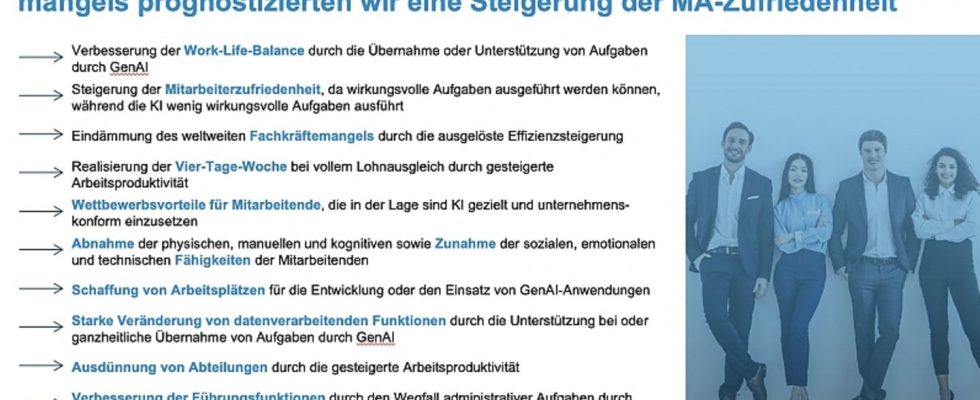Background: Artificial intelligence is taking over automobile production
The robo-managers are coming
AI in the automotive industry
© press-inform – the press office
Artificial intelligence is permeating the automotive industry. The smart software not only takes over the voice assistants in the cars, but gradually also the production and, above all, management and leadership functions.
AI is on everyone’s lips at the moment. Programs like ChatGPT have reached everyday life. Smarte plays a role in the automotive industry Software plays an increasingly important role in production. Algorithms already predict where errors are most likely to occur, thereby helping to increase quality and reduce costs at the same time. An important point in the fierce price war in the investment-intensive transformation to electromobility.
But that’s just the beginning. According to a study by the management consultancy Horváth, there is still great potential for automation in production through artificial intelligence. To be precise, the so-called generative AI, where the focus is on creating something new. Less in the actual production, which the manufacturers have already made very efficient, but in tasks that are indirectly related to production. Such as product design, development, production controlling, production planning, supply chain management or logistics planning.
According to the study, these will experience a quantum leap in automation through generative AI (“GenAI”) by 2029. When computer programs take over a large part of the tasks, there is less for humans to do. You can imagine what that means for jobs. The analysts examined various activities and came to the conclusion that up to 80 percent of tasks will no longer have to be carried out by skilled workers in the future, but can be taken over by AI applications. The analysts have created a ranking list of which jobs can be taken over by artificial intelligence and to what extent (the automation potential is given in percent).
Production controller (up to 80 percent) Production planner (up to 80 percent) Work planner (up to 80 percent) Software developer (up to 60 percent) Process engineer (up to 60 percent) Development engineer ( up to 60 percent) Technical production designer (up to 60 percent) Supply chain manager (up to 60 percent) Logistics planner (up to 60 percent) Systems engineer (up to 60 percent) Automation technician (up to percent) Supplier manager (up to 60 percent) Quality engineer (up to 60 percent) Project manager (up to 40 percent) Team leader (up to 40 percent) Department manager (up to 40 percent) Management (up to 40 percent)
When asked whether this ranking should be interpreted in such a way that four out of five of these jobs will be eliminated for positions that can be automated up to 80 percent, study director Tobias Bock answers: “Yes, the fifth person has a similar status to a pilot The aircraft only has a monitoring function or the task of validating the results. This presupposes that there will still be a need for experts and specialists to monitor the AI.” Whether all of this can be implemented so easily remains to be seen. People who have been doing this job for several decades will find it difficult to convince them to retrain. On the other hand, it is important for companies not to lose this experience.
The increased use of artificial intelligence is inevitably leading to a restructuring of job profiles. Especially since manager tasks can also be carried out by the computer programs. The Horváth experts assign leadership positions such as team leaders, department heads and management each an automation potential of up to 40 percent. The robo-manager can therefore take on some tasks. This includes overseeing the financial aspects of the business, including budgeting, accounting and financial reporting. This is accompanied by an automated analysis and evaluation of operational procedures and processes. Based on this, the software also takes over the further development of the corporate strategy.
So are managers also at risk of being cut short? The study does not assume this. Rather, the tasks are shifting towards emotional, ethical and social issues. “No resources for personnel issues and leadership – no manager will be able to excuse this in the future,” says study director Tobias Bock. “Technical skills are becoming less important, AI experience, leadership qualities and social skills are becoming more important.”

